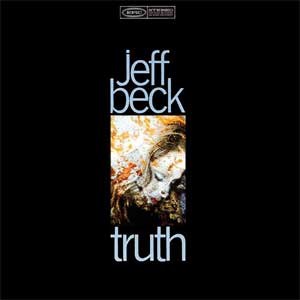After parting with the Yardbirds, the young axeman struck out for a solo career, but there was just one problem: he couldn’t sing. This is evident from his first single, the so-goofy-it’s-great “Hi Ho Silver Lining”, a record that included a more enduring B-side. The follow-up, “Tallyman”, wasn’t as embarrassing, nor as good.
Once it was established where his strengths lay, he put together a band that would attempt to set a precedent for a new kind of rock, balancing heaviness and lightness within the same song. A raspy kid named Rod Stewart would be his singer, bringing along Micky Waller on drums, while a chameleon named Ron Wood, already a guitarist on his own, would play bass. This lineup would record “I’ve Been Drinking”—used as the B-side to Beck’s instrumental butchering of the schlock classic “Love Is Blue”—before going on to record an album proper (incidentally, at Abbey Road in the weeks immediately before the Beatles started the White Album).
Truth is a likable hodgepodge of an LP, complete with self-deprecating notes from the man whose name graced the cover. It begins with a slowed down, groovy version of “Shapes Of Things”, which gives both Rod and Jeff a chance to show what they do best. “Let Me Love You” is one of those electric blues standards that everyone has to do at one point or another, while “Morning Dew” was the current folk equivalent, albeit with Jeff mangling the wah-wah pedal while an “unknown Scottish bloke” plays bagpipes. “You Shook Me” would be redone—some would say stolen—by Led Zeppelin a year later, complete with John Paul Jones on organ as he was on the Beck track. Here it’s merely two and a half minutes, grinding to a quick close described as “my guitar being sick”. A more subdued organ, with Keith Moon on tympani, drives a cover of “Ol’ Man River” from Show Boat.
If the listener wasn’t completely confused by now, the solo acoustic “Greensleeves”, precisely finger-picked, shows Jeff to be more than just flash. “Rock My Plimsoul” is another generic blues, better for the guitar than the lyrics. A nice addition is “Beck’s Bolero”, originally the B-side to his first single. Alongside the instrumental melody, we have Jimmy Page strumming an electric 12-string, John Paul Jones playing bass, Nicky Hopkins on piano, and Keith Moon on drums with a terrific howl a minute and a half in. Such catharsis is a memory for most of “Blues Deluxe”, yet another rote blues augmented by obvious added applause effects to give it that “club” feel. Finally, there’s “I Ain’t Superstitious”, a great nasty blues made even more diabolical by being in the key of F, especially difficult for bass players.
The abundance of blues tracks makes Truth less than perfect, but at least they’re spread out for variety, so the album manages to float well above the Mendoza line. Later reissues would pair it with the next Jeff Beck Group album, but today it can be found on its own with a pile of bonus tracks, including all the singles, and earlier versions of some of the album cuts.
Jeff Beck Truth (1968)—4

No comments:
Post a Comment